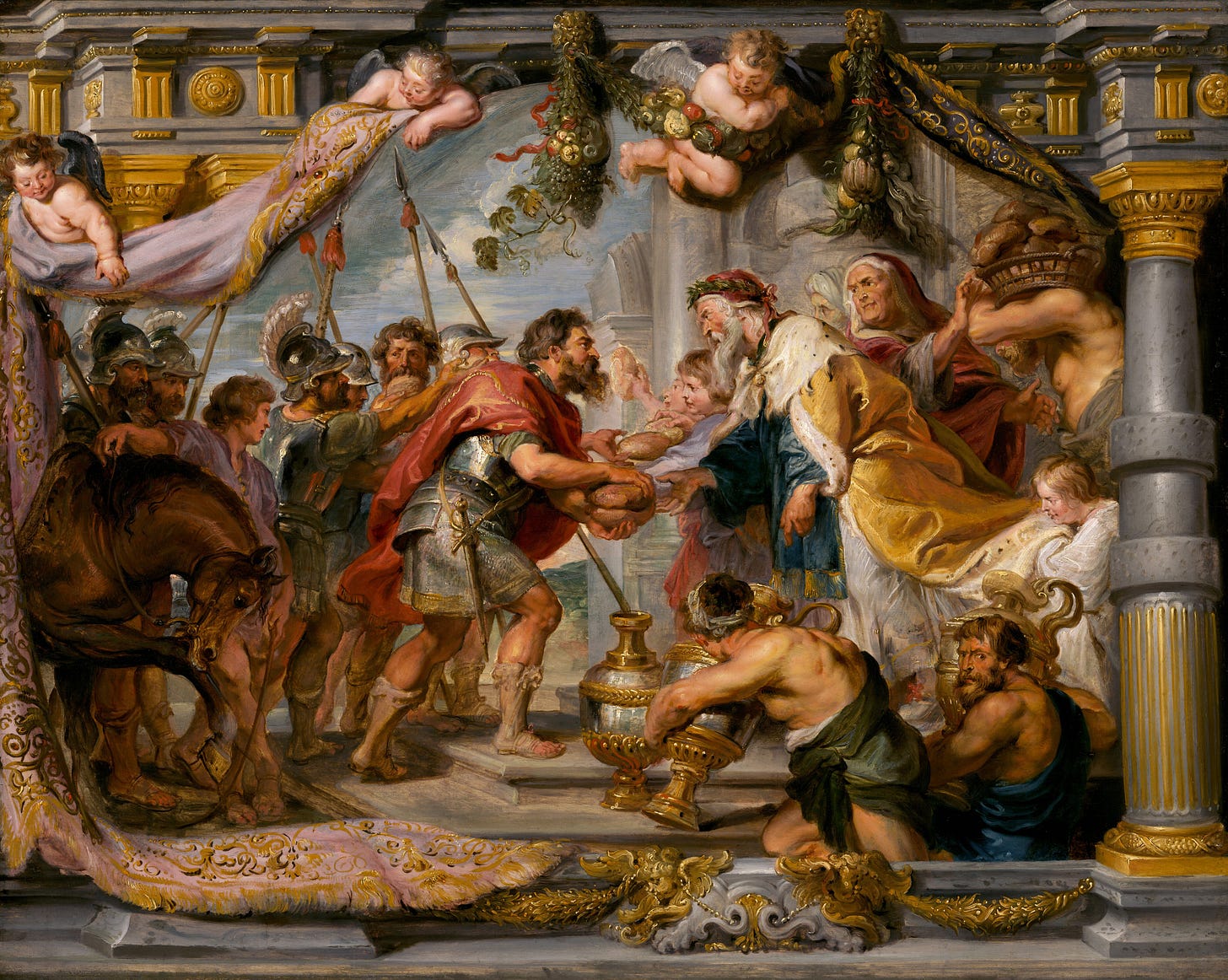“And I saw the holy city, new Jerusalem, coming down out of heaven from God”
— Revelation 21
In the first eleven chapters of the Bible we are given an unflinchingly negative introduction to the city and its nature: the city is what man created in response to loss of the eternal, loss of the divine; the city is an attempt to live forever in some way not unlike our unfounded faith in posterity; cities are both the product and the seed of kingdom and empire building, the product and the seed of war and technological innovation; the city, as the sum of centralization and progress, is man’s attempt at reaching for heavens and claiming the thrones of gods; the city is Babel, Babylon.
And yes, I’m reading into the stories, reading between the lines. But there are certainly no positive connotations for the city in the first eleven chapters of Genesis which lay the groundwork for the rest of the Bible. The closest we get to something positive in connection to the city is the reminder that Cain, the builder of the first city and thus the prototypical modern man, is marked by God for protection. God has a plan and man can’t undo it.
That’s the crazy part—throughout the Bible, we see people who didn’t do things exactly right or even close to it and we see God work with those people time and time again. When God’s people are eager to do God’s work, he seems to not only accept our works, but fix them.
And so it is with the city.

Humanity screwed it up big time in the first eleven chapters, but in the twelfth God is undaunted and undeterred and finds someone who will love him faithfully. From one man, and him as good as dead, were to be born as many as the stars of heaven.1 God found Abram and invited him into the story, and Abram would be transformed into Abraham by God much like the city of man would be transformed into the city of God.
And in the life of Abraham we see how complex the story of the city will become. We catch a glimpse of a city Abraham saw by faith, a city made and designed not by human hands. The way to this city is fraught.
Now the LORD said to Abram, “Go from your country and your kindred and your father’s house to the land that I will show you. And I will make of you a great nation, and I will bless you and make your name great, so that you will be a blessing. I will bless those who bless you, and him who dishonors you I will curse, and in you all the families of the earth shall be blessed.”
— Genesis 12:1-32
Already we have a deliberate contrast between the previous story, the tower of Babel, and what God says to Abram. At Babel man said, “let us make a name for ourselves.” But God says says to Abram, “I will make your name great.”
The desired end is the same. The means differ.
Another thing to remember is that we all come from Babel, for from there we were scattered. Abram is no exception. He is from Ur of Chaldea, of Babylonia.3 In one sense, Abram was the first of many that God would call out of Babylon.
“Come out of her, my people, lest you take part in her sins, lest you share in her plagues”
— Revelation 18
So Abram went, as the LORD had told him, and Lot went with him.
Genesis 12:4
It isn’t very long before we realize Babylon isn’t a single place on a map, however. It's many places, including within our hearts.4 But we’re getting ahead of ourselves—there are several more mappable Babylons in Abram’s future.
When they came to the land of Canaan, Abram passed through the land to the place at Shechem, to the oak of Moreh. At that time the Canaanites were in the land. Then the LORD appeared to Abram and said, “To your offspring I will give this land.” So he built there an altar to the LORD…And Abram journeyed on, still going toward the Negeb.
Genesis 12:5-9
Just like Noah,5 Abram is part of a new creation and commemorates it with an altar,6 a structure of stone. Just like Noah, Abram's construction is a far cry from that of Cain.7 Instead of a city we have a pile of rubble and yet God is somehow praised with this aggregation of flotsam. God is satisfied with this jumbled pile of unhewn stone in pathetic contrast to the mighty Babel of Abram’s elders.
“If you make me an altar of stone, you shall not build it of hewn stones, for if you wield your tool on it you profane it.”
— Exodus 20
No wonder Abram is headed for the Negev, the desert. The place where no city is yet constructed. The wilderness where God surrenders his claim to Azazel and yet is.8
But Abram’s plan is thwarted. There is famine, and he must go to another Babylon: Egypt. We know the story.9 At the expense of his wife Abram fails a test he will fail once again and returns by God’s grace to the place of the altar already built, that lone fragment of a world beyond our own or beyond the tower of Babel. He settles in the land God promised to him and his nephew in the edenic Jordan Valley near cities of the plain: Sodom and Gomorrah.10 Babylons.
It is at this point with Abram settled peacefully in the promised land that Babylon again rears its ugly head. A war as meaningless as all will come to be in the annals of history begins and the people of Sodom and Gomorrah are captured, among them Abram’s nephew Lot and his family.11
Abram’s actions in response to the news of this event bring us to the first truly confounding factor in the biblical story of the city.
When Abram heard that his kinsman had been taken captive, he led forth his trained men, born in his house, 318 of them, and went in pursuit as far as Dan. And he divided his forces against them by night, he and his servants, and defeated them and pursued them to Hobah, north of Damascus. Then he brought back all the possessions, and also brought back his kinsman Lot with his possessions, and the women and the people.
After his return from the defeat of Chedorlaomer and the kings who were with him, the king of Sodom went out to meet him at the Valley of Shaveh (that is, the King’s Valley). And Melchizedek king of Salem brought out bread and wine. (He was priest of God Most High.) And he blessed him and said,
“Blessed be Abram by God Most High,
Possessor of heaven and earth;
and blessed be God Most High,
who has delivered your enemies into your hand!”And [he]12 gave him a tenth of everything.
Genesis 14:13-20
It’s an odd passage to be sure. The first glimpse at communion. The first tithe. A divine or angelic king? I don’t know. Much ink has been spilled expounding various Jewish and Christian interpretations and meanings but we must narrow our focus.
Melchizedek, or Malki-tsedeq, a name or title perhaps meaning “king of righteousness” or “my king is righteous” or “my king is Tsedeq.”13 And he is the king of Salem, or Shalem. The king of the city of peace. How can this be?
When God brings his people out of Babylon or Egypt or Sodom, out of war and through the waters, he brings them to the city of peace. The city that will one day be called Jerusalem, or Yerushalayim.14 Not just the city of peace, but the city of God. The city unlike any man can make.15
“Behold, I am doing a new thing;
now it springs forth, do you not perceive it?”
— Isaiah 43
Abraham desired a better country and homeland than the ones he left and God is not ashamed to be called Abraham’s God. God prepared for him a city16 and gave him a glimpse of it as he ate bread and drank wine with Malki-tsedeq.
The real Salem, the real earthly Jerusalem, cannot be what God promises it to be. It has to be transformed by God. And the same is true for Abram, who had to be transformed into Abraham by an external force. It was always only God who could make Abram’s name great, not the work of man.17
Avram, the exalted father, must become Avraham, the father of multitudes.
And Yerushalayim, God’s city of peace, must become Yahweh-Shammah: God is there.
“And the name of the city from that time on shall be, The LORD Is There.”
— Ezekiel 40-48
But we’re getting ahead of ourselves again. Abraham is still Abram, and he has further brushes with earthly cities in his future.
Heb 11:12.
Biblical quotations are in ESV unless otherwise noted.
Gen 11:31, cf. 15:7.
Cf. Ezek 36:24-28.
Gen 8:20.
There are two altars in the biblical story, but it is beyond the scope of this post to consider the significant implications.
Gen 4:17.
Lev 16.
Gen 12:10-20.
Gen 13.
Gen 14:1-12.
The ESV reads Abram, but the Hebrew text doesn’t specify.
If this last option makes it appear that Melchizedek was a pagan, consider that tsedeq, or “righteous,” can be part of biblical titles for God as well. E.g. the most literal readings of Psa 17:1: “YHWH, righteousness” or “YHWH-tsedeq.”
Cf. Psa 76:2.
I’m not arguing with history here. Salem was a city and it was made by human hands—I assume. But we must not relegate the Bible to mere history, for we know that Abraham was looking beyond the physical plane.
Heb 11:8-19.
It was Abraham’s earthly father who brough Abram out of Babylon physically (Gen 11:31), but it was always God who took Abraham out of Babylon in the ways that mattered (Gen 15:7).




